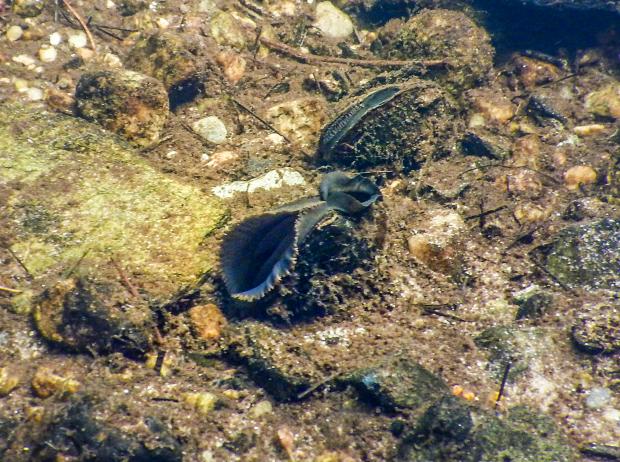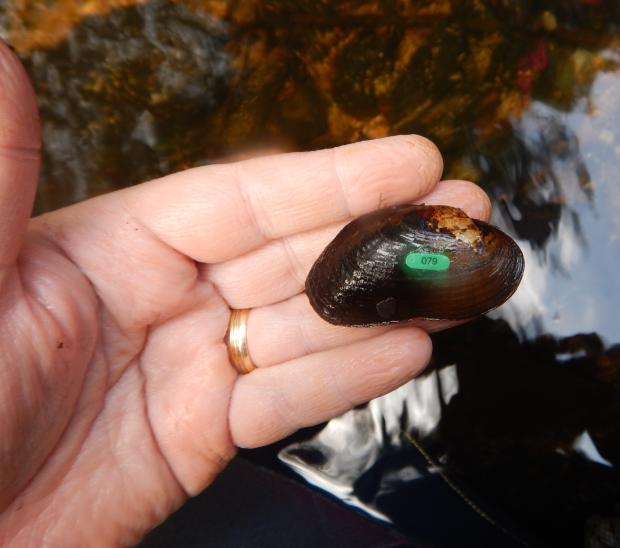Mussels of Massachusetts
Of the 12 freshwater mussel species in Massachusetts, 6 are protected under the Massachusetts Endangered Species Act. MassWildlife’s Natural Heritage and Endangered Species Program works with partners to study mussels to aid in their conservation and restoration. With knowledge gained from studies, we are better able to protect land and improve habitat at high-priority sites. See all mussels listed as endangered or of special concern.
How mussels live
- Mussel mobility is limited: total lifetime travel in adulthood of only a few feet, or even inches!
- Female mussels lure fish using modified flesh of their “mantle” at the opening, to mimic crayfish, minnows, and snails, as well as by generating packets of glochidia that look like insect larvae.
- Mussel larvae move upstream (or downstream) by “catching” a ride on fish gills and other fish body parts, consuming nutrients from fish tissues as they travel.
- Larvae ride fish for weeks to months. They transform into juveniles without harming host fish.
- Juveniles drop from host fish, burrow into substrate, and remain for years while growing. They emerge as filter-feeders, trying to reach full maturity and reproduce.
- Juveniles and adults can travel along the substrate and use their "foot" to bury themselves.
- "Generalist” mussel species attach and grow on several fish species. Examples include brook floater (state endangered), creeper (state special concern), and possibly eastern elliptio, the most-encountered species in MA.
- “Specialist” mussel species can only attach to a few closely related fish species. Eastern pearlshell, for example, can only use trout and salmon, while yellow lampmussel (state endangered) and tidewater mucket (state special concern) can only use perch and bass.
- Mussels are highly susceptible to habitat degradation, due to their limited mobility, filter-feeding, and dependence on fish. They are among our most imperiled freshwater species groups.
- At the beginning of their long lives (some live 70–100 years!), freshwater mussel larvae called glochidia attached to the gills or fins of fish for about 3 weeks. The fish act as a source of nutrients and transportation until the mussels fall into waterway beds and begin their lives of filtering.
Mussel conservation
Why help mussels?
In addition to being endangered or otherwise protected, mussels provide critical ecological services to all Bay Staters by filtering algae, bacteria, and fungi out of our water. Removing barriers for mussels also results in removing barriers for the freshwater fish populations they depend on. Adding aquatic connectivity reconnects isolated populations, improves and increases habitat, and helps resilience against future stressors such as commercial or residential watershed development.
How MassWildlife helps mussels
- Surveys often involve waders, buckets, wetsuits, and other gear to find beds and rare species.
- Tagging populations of conservation priority, like the state endangered brook floater, uses unique markers to track survival and growth over time.
- Coordinated restoration efforts improve habitat for mussels and their fish hosts. Removal of the Millie Turner and Sucker Brook Dams on the Nissitissit River, for example, increased habitat for brook floater, which has only four remaining populations in MA.
- Continued monitoring tracks populations and habitats for decades and is key to long-term success.
More mussel resources
- Freshwater Mollusk Conservation Society
Learn about mussels and explore the issues that have lead to this decline. - Xerces Society for Invertebrate Conservation
Explore publications and blogs about freshwater mussels and other invertebrates in need of conservation. - Brook Floater Conservation Initiative
Learn about the multi-state Conservation Initiative launched in 2016 to conserve and restore the imperiled brook floater mussel.
Contact
Online
| Date published: | June 6, 2022 |
|---|---|
| Last updated: | June 6, 2022 |

